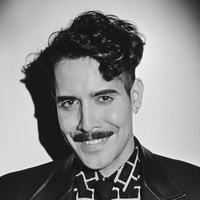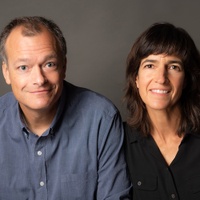As told to John Norris, 2651 words.
Tags: Music, Film, First attempts, Beginnings, Process, Failure.
On letting go of one chapter and starting a new one
Musician and filmmaker Alan Palomo (Neon Indian) discusses starting from scratch, growing as a musician, and building a new disciplineOriginally published on November 16, 2023
It’s been a long time since we’ve spoken, Alan, and I feel like it’s a new you.
Yeah, obviously like, with the name change comes a kind of re-brand, and it’s causing work on the front end, like the algorithm. I know it’s tough to get all the Neon Indian fans to understand that the name has changed but it’s the same guy! That being said, yes, this is definitely the double-breasted suit, saxophone era!
The way World of Hassle came about is so interesting because you’ve said you were 70 percent done with a long-awaited fourth Neon Indian album—a cumbia music project infused with politics—when you decided to chuck that and start over with this very different record.
The idea of making some kind of sophisti-pop album existed in my head. I had thought, “Okay, we’ll make the psychedelic cumbia record, then we’ll move on to that project.” But I think that my head was already on the next project and as I was trying to make this cumbia record, just, things weren’t sticking. I only really got a couple of ideas from that album that I liked. But then this album—the synth I used was the Casio CZ-5000? I got it for like 500 bucks and it just sat against the wall for a few years. I was like, “When I am ready to make this sophisti-pop thing? That’s the palette I want to play around with.” Sure enough, the process of trying to finish this cumbia record was also kind of ill-fated, with a tour that had been booked before the album was even done, under the assumption that it would be done by then. It comes to tour time, and they were like, “We need at least a single,” something we could tour off of. We ended up making up “Toyota Man” [2019] and the video, a six-week thing, then we were on the road a couple months, and by the time I came back, I was like, “What was I making again?” I had totally lost the thread. Suddenly, COVID starts. And there’s no deadline anymore. So I decided to start from scratch. There was that Casio sitting there against the wall. I thought, “Okay, it’s time to turn it on and see what it can do.”
Doing something like this and setting aside one project to say, “I’m all in on this new thing”—is that the first time you’ve ever done that? And is that experience as an artist exciting, intimidating, scary a little bit?
You never want to accept failure. For me, I pride myself on how if I tell myself I’m gonna do something, I do it. If you’re somebody that has follow-through, in the process of making a record, there is a moment where you’re like, “Is the juice worth the squeeze on this one?” How passionate are you about the finished product? Giving yourself a specific lane to work within, I’ve learned is probably not the best way to work. You can think you’re making one type of record and you land somewhere else! It’s a beautiful misfire because you end up with something completely unexpected. This time around, starting from scratch, the influences were definitely there, but I also wanted to give myself the chance to be free. Don’t write about anything in particular. Just write about where your head is at, at the moment. What you’re listening to, what you’re feeling. Starting from scratch can feel like a momentary failure. But it really does motivate you to come back swinging with something strong.
You’ve referred to the sophisti-pop move coming as a result of thinking, “Well, I’m 35—what would my 50-year-old self think of what I am doing now?” Do you think there is such a thing as “age-appropriate” music? Do you give much thought to how what you create will be received?
I really try not to let critical reception and the perception around it, influence the work. Obviously, that comes with the side note that occasionally, influence is inevitable if you’re trying to make a living from it. The way I quantify success is, “Do I have the resources to make the thing that I want to make next?” The brain is always kind of a backlog. I imagine it as papers piling up of unrealized projects, whether it be in film or music. I look at the lifelong narrative, like the post-modern, self-aware artist that creates some arbitrary number of how many records they want to make, or they treat their life like, “At this age I’ll do this, and at that age I’ll do that.” I think that comes from having a certain level of self-awareness. Then your records start playing into that or you want to make that part of the experience, for the fans and for the haters. You want to lean into these things.
I went to a British design museum some years back and they were having an exhibit on Kubrick. They structured it really well, starting from personal things like his pocket computer from 1992 and he was starting to work on Eyes Wide Shut, or his typewriter, and all of these artifacts. You realize that this guy really imagined the libretto of his own life and really played his moves like a chess player. Which he was! It was admirable. I’m not operating at the same level but I at least aspire to create goals that feel age-appropriate. The next thing I really want to get into is filmmaking and it’s something I’ve slowly been doing, it’s a gradually-building process.
So filmmaking is next. You’ve been directing your own videos for a while now, including, this year, the Giallo-ish “Meutrière” and you and Mac DeMarco in animated form in “Nudista Mundial ’89.”
Unfortunately having a music career doesn’t allow you to abandon what you’ve built, in pursuit of something else, or pursuit of a medium you’re not proven in at all. But I decided in 2015, if I don’t have time to build a directorial reel while doing Neon Indian, then at the very least I can build and direct all the videos. This time around, the intention was to continue working through these concepts and just get more experience on set. That’s the next move, I want to make a feature film. The things that fans don’t know about—it might seem to them I’ve been up to nothing, but I’ve been slowly building this whole thing out. I really want to do that, after music.
Why not go for it?
I am so much happier with what I am writing now, as opposed to what I was writing when I was 27! Having all this anxiety about, “Paul Thomas Anderson made Boogie Nights when he was that age!” But you know, he’s a freak of nature in that regard, the man’s a genius. I would say I feel so much more comfortable now in what I am writing, my sense of story structure, all of that. And World of Hassle to some extent continues to be this guy who wants to make movies, but since he can’t do that, he’s trying to incorporate these cinematic elements into his records. That’s the Alan Palomo I want to be at 50. The guy who just goes by his name, and you know him as a director, you know him as a musician, who knows what else. It might be a book today, it might be a photo book, it might be a movie, it might be poetry, it might be an art exhibit, it might be a record.
Do you think there are people who want to keep you in one place? My corollary to that is there are plenty of people who seem to think I should only write about music from when I was starting out like 30 years ago.
In this moment I am literally doing what you’re describing, in the sense that people who want to see another Neon Indian record, who want to see a Psychic Chasms part four, there are certain desires to not want to be musically redundant, to not tread the same path. I am happy to perform the songs live. It’s like you have this window where you’re still kind of plugged in. I will say that putting out a record in 2023 is a completely different animal even from 2018.</a> We don’t know, even the label doesn’t know, what “the big single” will be. Everything is out of our hands. That element of if feels scary. The financial aspect. I will say it felt like I could pivot musically without it feeling like a move that is a reaction to age or wanting to be age-appropriate. It’s almost like I did it prematurely, like, “Okay, let’s just start with the suits and the sax now!”
Are you the type who’s inclined to over-think things, whether that is a melody, an arrangement, a lyric, maybe a visual like the little sayings on the album cover?
I definitely am an over-thinker. In particular about the production elements of it, I just have to sit there with my eyes squinting, focusing very intently on what’s working and what isn’t working. That’s a part of why the records take so much time to make. Sometimes there is this “first idea, best idea” approach. A vocal melody comes to me and I’ll be like, “That’s great.” Forming them into lyrics is a whole different thing. Sometimes you get great lyrics and they don’t fit any melody you can come up with. Sometimes you get a melody and you just can’t put words to it. There’s a constant back-and-forth. Even if you look at the record cover and the gatefold, I mean, Robert [art director Robert Beatty] and I worked on that for like four months! We just kept going over every little idea. I would send him copy and he would come up with this idea, and we would put that in like the AI program and it would spit one out back at us, and we only took the funniest ones. AI was much better at spouting like, nonsense. Mine were too cute, they had a very obvious punch line.
So how do you know when something is done? Even like as you say during the pandemic it felt like there were no real timetables, but at some point with anything don’t you have to say, “I’ve got to wrap this up?”
Honestly, I know when something is done if nothing bothers me about it.</a> By the time you’re done with the idea I might not be in love with the song the same way I was when it was first coming together, but if I can listen to all of it, and not cringe at anything, or have any notes about it, it’s done.</a> Paul Thomas Anderson talks about writing a screenplay and he says it’s like ironing a shirt, every time you iron the shirt, you go a little further out, and further out, and further out. That’s kind of how it is for me with music—and even just with the artwork stuff. You know there would be so many things—Robert just kind of knows to just keep sending it, at every phase of the process. I will have notes, and ideas and at the end we both just kind of look at it and we’re like, “This is done, right? We can’t fit anything else on this. This feels correct.”
I know you improved as a musician through working on this record, right?
My pet project during the pandemic was just to become better at creating, better at music. There’s an attitude when you’re starting out—there’s an interview with River Phoenix, from Berlin when they had given him an award for My Own Private Idaho, and he’s like “I don’t really want to talk about the process.” He’s drinking a beer, just being very hedonistic, but he talked about how he sees his gift with acting as this thing that remains a mystery to him, and that he doesn’t want to learn more about it because he doesn’t want to taint it. That may be true. I would say for actors that may certainly be the case. With music, the more records you make, you will hit this thing where, the more you treat it like, “I don’t know what I’m doing! I don’t want to know what I’m doing!” as things evolve, there’s certain doors that will remain closed if you don’t sit with your instrument and really learn it.
You’ve said that there comes point where you realize what you’re doing is a profession or vocation. So does that mean it’s a job?
It is, but not in the sense that along with it comes an inevitable drudgery. This comes more from watching my father [musician Jorge Palomo, a ‘70s/’80s Mexican pop star] layer his vocation throughout my life. When I first started Neon Indian, he was like, “This is the hiring phase. Just wait, you’re having fun with your friends on the road, but just wait. This is going to turn into a profession like any other.” It’s just the idea of taking it serious and to really feel qualified for the title. It’s not something I run away from anymore. My one criticism of younger Millennials or Gen Z is there’s a sort of habit of giving yourself a title before anyone’s paid you to do it. In my eyes, until someone hands you a check, and somebody compensates you for it, that is not a job. That is not a title. You can’t just call yourself that. I want to be worthy of the title and do something that is honorable, in the way that a jewelry maker labors at his vocation, like a guy who trims trees. Whatever it is you’re doing, just be great at doing that. That’s why I say it is a profession.
Alan Palomo recommends:
Elmore Leonard! [Get Shorty, Out Of Sight, Rum Punch]. I’ve just gotten back into reading his capers. At the moment I’m reading Freaky Deaky [1988] and it’s pure pulp bliss.
Homage Brewing – it’s a wine bar with a really good sound system in L.A. I went there recently to see JackJ. I was impressed by both the counter curation and the sound system.
There’s an Instagram and site called Cathode TV or Cathode Cinema, that are fine purveyors of both filth and fine art, the best thing to happen to streaming in a minute. Three to four nights out of the week they will program a series of films that vary from like super art to full trash and some even like weird obscure pornography from the ‘70s, or ‘80s.
Lincoln Olivetti-produced records. He was a Brazilian hit doctor back in the day. And if you wanted like a boogie-pop 7-inch, he was the man to call. He had a good friend named Robson George, and they made a record together. But he mostly produced for Rita Lee, Tim Maia, Marc Valle, “Estrelar,” that everybody loves, he produced that.
Thinking of Ibiza, let’s go with Yves Uro—he made all of the flyers to Club KU [now Privilege] in Ibiza, all throughout its existence [1979-95]. He did all these crazy acid house rave posters and his graphic design is something I have been completely obsessed with. I was able to score an original poster of his before IDEA Books did a retrospective for like two hundred bucks, which—I don’t think they go for that anymore!




